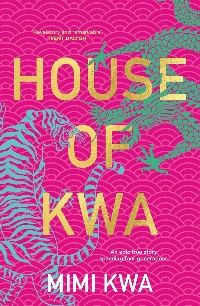Blog tour: House of Kwa by Mimi Kwa

This post is part of a blog tour organised by Random Things Blog Tours. I received a free copy of the book in return for an honest review.
‘The dragon circles and swoops… a tiger running alone in the night…
‘Mimi Kwa ignored the letter for days. When she finally opened it, the news was so shocking her hair turned grey. Why would a father sue his own daughter?
‘The collision was over the estate of Mimi’s beloved Aunt Theresa, but its seed had been sown long ago. In an attempt to understand how it had come to this, Mimi unspools her rich family history in House of Kwa.
‘One of a wealthy silk merchant’s 32 children, Mimi’s father, Francis, was just a little boy when the Kwa family became caught up in the brutal and devastating Japanese occupation of Hong Kong during World War II.
‘Years later, he was sent to study in Australia by his now independent and successful older sister Theresa. There he met and married Mimi’s mother, a nineteen-year-old with an undiagnosed, chronic mental illness. Soon after, “tiger” Mimi arrived, and her struggle with the past – and the dragon – began…’

In House of Kwa, Mimi Kwa takes us through nearly 140 years of her family’s history, from her formidable great-grandfather’s sprawling compound in late nineteenth-century China to her own life as a broadcast journalist and mother-of-four in Australia today.
More than anything, though, this is a portrait of Kwa’s larger-than-life father Francis and his kindly sister, Aunty Theresa; the circumstances that consolidated the pair’s very different personalities; and what it was like to grow up as the daughter of one and niece of the other.
While House of Kwa is a memoir, Kwa’s talents for imagination and storytelling, applied to her extraordinarily rich source material, give it a real literary quality. She fleshes out scenes from different times and places before she was born with so much detail and emotion, it’s as if she was there.
Her father in particular gives her a lot to work with. By turns resourceful, eccentric, audacious, avaricious, irrepressible, and egotistical, if an author made him up, their editor would command them to tone him down to make him more believable. You never know quite what Francis is going to do or say next, often making him very entertaining in a watching-through-your-fingers way.
Kwa laughs with you at Francis’ hare-brained schemes and ridiculous behaviour, but also elucidates the pains of having such a character for a father, from public embarrassment and inattentive parenting, to being put in danger of real harm (she’s left in charge of the youth hostel he owns for a day, at an age when many parents would be reluctant to leave their children home alone for even an hour) and being sued when they clash over the execution of Aunty Theresa’s will (Francis is infamous as a vexatious litigant).
Francis’ neglect and insensitivity, and the distress Kwa’s mother, Mela (the couple have a rocky marriage, and divorce after a few years) causes to her young child by dint of a serious, untreated mental illness, would suggest that Kwa is a prime candidate for complex PTSD.
However, as she explains in the epilogue, it wasn’t until she sat down to write this book – which gave her the time and space to really think about things – just how much she saw and experienced that no child should. She was therefore in middle age when the emotional consequences caught up with her, which isn’t uncommon.
Kwa also refers to factors that mitigated her less-than-ideal upbringing: the self-belief instilled in her as a member of the Kwa line born in the Year of the Tiger, and the love, comfort and stability she could rely on from her maternal grandparents and Aunty Theresa.
You’d be hard-pressed not to fall in love with Aunty Theresa on the strength of Kwa’s descriptions. For Kwa personally, a visit to her aunt in Hong Kong or – later on – Manila, was something to look forward to, as her aunt showed her so much affection and care, and they would spend a lot of quality time together.
More generally, Aunty Theresa comes across as glamorous (having been an air hostess when plane travel was prestigious), popular (she knows lots of people in high places, and is welcomed wherever she goes), and generous (having paid for her siblings’ education). I was genuinely sad when she died, and this was exacerbated by the behaviour of Francis and another sibling, Clara, in the wake of her death.
Kwa’s narrative of her family history, as well as being interesting in itself, goes some way towards explaining – though not excusing – Francis. We learn that his father and grandfather claimed royal descent and were emperors in their own households, practicing polygamy and having multiple children with each wife.
Receiving little affection from his parents himself, Francis grew up amid everyday cruelties (husband against wives and children, wives against children and maids) and extraordinary atrocities (the Japanese occupation and US bombing of Hong Kong during the Second World War). As the family’s financial fortunes reversed, he went out to work as an assistant to a local blacksmith at the age of seven, then collaborated by helping out at the Japanese barracks.
While Francis appears to have carried around and repeated his childhood experiences, Theresa comes across as more of a cycle-breaker. This shows how two siblings in the same household can turn out very differently depending on their year of birth, gender, and temperament.
As a Chinese girl, it was dangerous for teenage Theresa to go outside during the occupation, so she didn’t have to get a job at such a tender age as Francis. As the oldest girl still at home, and having a caring disposition, she didn’t need to be persuaded to look after her younger siblings. While she did have a Filipino maid – Brigit – as an adult, and they could never be on an equal footing, Theresa nonetheless treated her with not-inconsiderable respect and generosity.
House of Kwa is a captivating, well-written, and moving family portrait.
